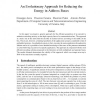Free Online Productivity Tools
i2Speak
i2Symbol
i2OCR
iTex2Img
iWeb2Print
iWeb2Shot
i2Type
iPdf2Split
iPdf2Merge
i2Bopomofo
i2Arabic
i2Style
i2Image
i2PDF
iLatex2Rtf
Sci2ools
106
click to vote
ISICT
2003
2003
An evolutionary approach for reducing the energy in address buses
In this paper we present a genetic approach for the efficient generation of an encoder to minimize switching activity on the high-capacity lines of a communication bus. The approach is a static one in the sense that the encoder is realized ad hoc according to the traffic on the bus. This is not, however, a limiting hypothesis if the application scenario considered is that of embedded systems. An embedded system, in fact, executes the same application throughout its lifetime and so it is possible to have detailed knowledge of the trace of the patterns transmitted on a bus following execution of a specific application. The approach is compared with the most efficient encoding schemes proposed in the literature on both multiplexed and separate buses. The results obtained demonstrate the validity of the approach, which on average saves up to 50% of the transitions normally required.
Related Content
| Added | 31 Oct 2010 |
| Updated | 31 Oct 2010 |
| Type | Conference |
| Year | 2003 |
| Where | ISICT |
| Authors | Giuseppe Ascia, Vincenzo Catania, Maurizio Palesi, Antonio Parlato |
Comments (0)

